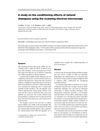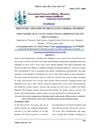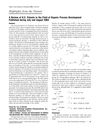A new method can quickly and accurately detect illegal chemicals in hair loss products.
 10 citations,
June 2001 in “International Journal of Cosmetic Science”
10 citations,
June 2001 in “International Journal of Cosmetic Science” Natural shampoos made in the lab conditioned hair better than commercial ones with chemicals.
2 citations,
November 2016 in “Current sexual health reports” Over-the-counter products can help with menopause symptoms, but be aware of their ingredients.

Human hair keratins can be turned into useful 3D biomedical scaffolds through a freeze-thaw process.
 1 citations,
August 2024 in “Polymers”
1 citations,
August 2024 in “Polymers” Bacterial cellulose is a promising material for biomedical uses but needs improvements in antimicrobial properties and degradation rate.
 March 2023 in “International journal of biology, pharmacy and allied sciences”
March 2023 in “International journal of biology, pharmacy and allied sciences” The shampoo made with rice water and natural ingredients is safe and effective for improving hair health and reducing hair loss.
 84 citations,
June 2010 in “The Plant Cell”
84 citations,
June 2010 in “The Plant Cell” Phospholipase A2 is necessary for the correct placement of PIN proteins in plant roots, affecting root growth.
 5 citations,
May 2023 in “Frontiers in immunology”
5 citations,
May 2023 in “Frontiers in immunology” Environmental factors like diet and vitamin levels, especially Vitamin D, can affect autoimmune diseases differently, with lifestyle changes potentially improving outcomes.
 4 citations,
January 1974 in “The BMJ”
4 citations,
January 1974 in “The BMJ” All medications can cause skin rashes, often without a clear cause, and better tests are needed to identify these drug-related skin issues.
 3 citations,
January 2023 in “PloS one”
3 citations,
January 2023 in “PloS one” Implanting hair-follicle stem cells in mice brains helped repair brain bleeding and reduced brain inflammation.
 December 2024 in “Turkish Society of Clinical Biochemistry”
December 2024 in “Turkish Society of Clinical Biochemistry” Higher BPA levels may be linked to idiopathic hyperandrogenemia in women.
 17 citations,
January 2020 in “Skin appendage disorders”
17 citations,
January 2020 in “Skin appendage disorders” Certain diets may help with hair growth in people with different types of hair loss.
 January 2020 in “Asian journal of applied science and technology”
January 2020 in “Asian journal of applied science and technology” Good nutrition is crucial for health and preventing disease, and supplements can help prevent nutrient deficiencies.
8 citations,
May 2020 in “International journal of biological macromolecules” Certain treatments can increase protein binding to natural hair but are less effective on permed hair.
 April 2020 in “Food Research”
April 2020 in “Food Research” The document discusses various topics including the use of plant derivatives for hair loss, potential food additives, antioxidant properties of different extracts, and the study of bacteria on stainless steel surfaces.
1 citations,
November 2023 in “Polymers” Polyurethane dressings show promise for wound healing but need improvements to adapt better to the healing process.
 1 citations,
October 2017 in “Food Additives & Contaminants: Part A”
1 citations,
October 2017 in “Food Additives & Contaminants: Part A” A new minoxidil-like substance, triaminodil, was found in an illegal hair growth supplement.
 16 citations,
January 2017 in “Physical chemistry chemical physics/PCCP. Physical chemistry chemical physics”
16 citations,
January 2017 in “Physical chemistry chemical physics/PCCP. Physical chemistry chemical physics” The 3D structure of a key hair protein was modeled, revealing specific helical structures and stabilization features.

Understanding hair surface properties is key for effective hair care products.
 September 2018 in “Asian journal of pharmacy and pharmacology”
September 2018 in “Asian journal of pharmacy and pharmacology” Honey has many health benefits and is good for you.
 45 citations,
June 2016 in “Anais brasileiros de dermatologia/Anais Brasileiros de Dermatologia”
45 citations,
June 2016 in “Anais brasileiros de dermatologia/Anais Brasileiros de Dermatologia” Silicon can improve skin and hair health, but more research is needed.
 41 citations,
October 2000 in “Dermatologic clinics”
41 citations,
October 2000 in “Dermatologic clinics” Better hair care products are needed to protect against grooming and chemical damage.
 November 2021 in “Journal of pharmaceutical research international”
November 2021 in “Journal of pharmaceutical research international” Herbal depilatories are safer and cause fewer side effects than chemical ones for hair removal.
 2 citations,
October 2004 in “Organic Process Research & Development”
2 citations,
October 2004 in “Organic Process Research & Development” The document reviews 20 U.S. patents from July and August 2004 about new drug forms, cancer treatments, aroma chemicals, statin drugs, and various chemical production methods.
 October 2001 in “WORLD SCIENTIFIC eBooks”
October 2001 in “WORLD SCIENTIFIC eBooks” Many substances, including chemicals and metals, can cause skin reactions; careful handling and identification of allergens are crucial to prevent dermatitis.
 1 citations,
July 2005 in “Drugs and the pharmaceutical sciences”
1 citations,
July 2005 in “Drugs and the pharmaceutical sciences” Targeting drugs to hair follicles can treat skin conditions, but reaching deep follicle areas is hard and needs more research.
 75 citations,
March 2009 in “Journal of The American Academy of Dermatology”
75 citations,
March 2009 in “Journal of The American Academy of Dermatology” CCCA is a hair loss type affecting African women, possibly caused by grooming and chemicals, with various treatments and needing more research.
 55 citations,
October 2003 in “Dermatologic Clinics”
55 citations,
October 2003 in “Dermatologic Clinics” Different hair care practices and conditions affect African American hair and scalp health, requiring specialized knowledge for treatment.
 44 citations,
January 2010 in “International journal of trichology”
44 citations,
January 2010 in “International journal of trichology” Choosing the right shampoo for your hair type is crucial.
 6 citations,
September 2014 in “Food Additives & Contaminants: Part A”
6 citations,
September 2014 in “Food Additives & Contaminants: Part A” New method effectively detects illegal hormones in anti-aging foods.

























